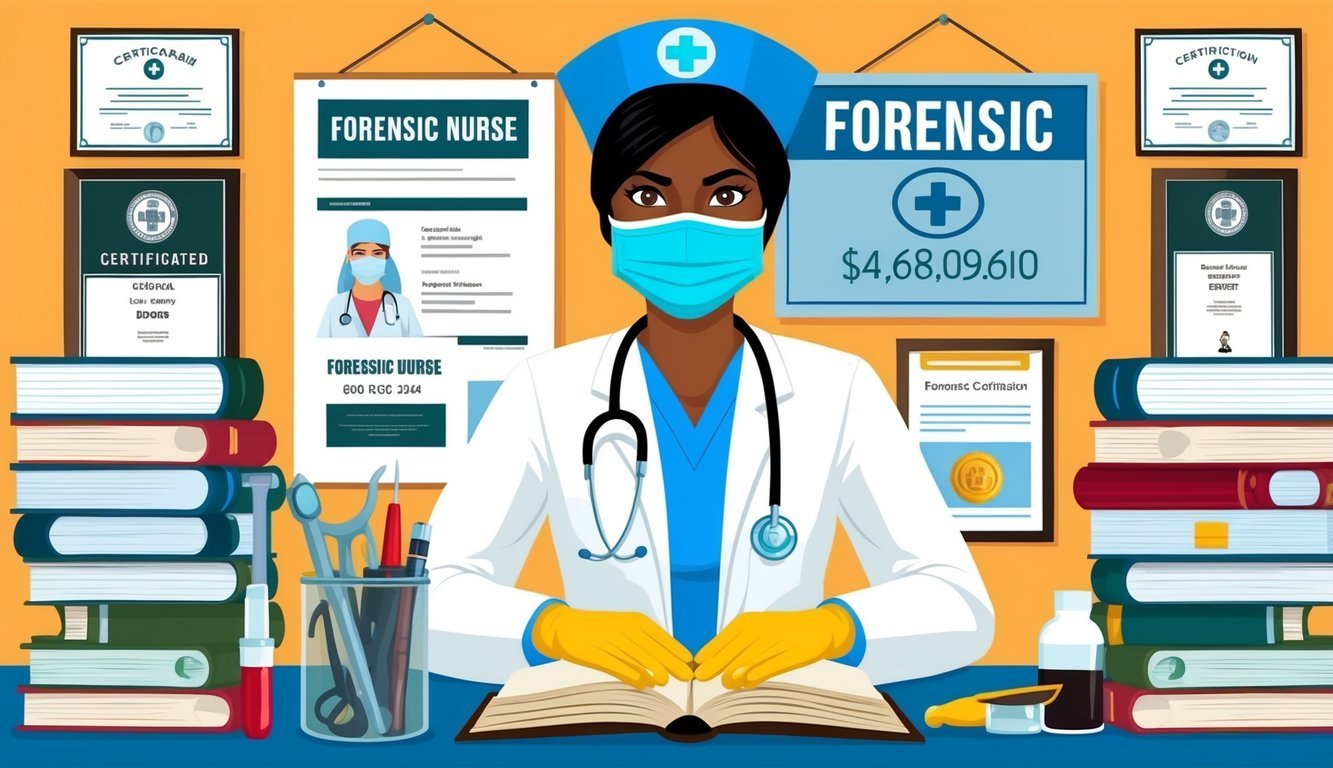Forensic nursing is a unique specialty that combines healthcare with the legal field.
Forensic nurses play a crucial role in collecting evidence and caring for victims of crime.
The average salary for a forensic nurse is around $65,466 annually.
However, this can vary based on factors such as location, education, and experience.
As you explore the world of forensic nursing, you’ll discover the educational pathways available, including the necessary certifications that can boost your career.
Understanding the financial benefits of this profession can help you decide if it is the right fit for you.
With the rising demand for healthcare professionals in specialized fields, forensic nursing offers a promising career path.
The combination of medical skills and investigative duties makes this role both rewarding and challenging.
Key Takeaways
- Forensic nurses earn an average salary of $65,466 per year.
- Educational qualifications and certifications can enhance career prospects.
- The demand for forensic nurses is expected to grow in the coming years.
Role and Responsibilities of a Forensic Nurse

Forensic nurses play a vital role in the intersection of healthcare and the criminal justice system.
Their responsibilities include working closely with law enforcement, providing support to trauma victims, and taking on specialist roles in various forensic cases.
Working with Law Enforcement
As a forensic nurse, you collaborate with law enforcement professionals to ensure that evidence is collected appropriately.
This can involve documenting injuries and collecting samples in cases of violence or abuse.
You may conduct examinations for victims of sexual assault, providing critical evidence that can be used in court.
This process requires a strong understanding of legal protocols and the ability to provide expert testimony when necessary.
Having clear communication with law enforcement is key for effective case management.
Supporting Trauma Victims
Your role extends beyond evidence collection; you also provide emotional and physical support to victims who have experienced trauma.
This includes validating their experiences and ensuring they feel safe during examinations.
You may perform trauma assessments to identify injuries, document findings, and develop treatment plans.
Your skills as a nurse allow you to address both physical and psychological needs, which is essential in situations involving violence or abuse.
Specialist Roles in Forensic Nursing
Forensic nurses often take on specialist roles, such as Sexual Assault Nurse Examiners (SANE).
In this position, you are trained to conduct exams specific to sexual assault cases and collect evidence appropriately.
In addition to examining victims, you may also work with communities to educate them on the biological and psychological impacts of violence and abuse.
Through this education, you help raise awareness and promote prevention strategies within your community.
Educational Pathways and Certifications

Becoming a forensic nurse requires specific educational pathways and certifications that blend traditional nursing with specialized forensic training.
These credentials help you qualify for this unique field while ensuring you meet the necessary standards to provide care and support in legal situations.
Nursing Degrees and Licenses
To enter the field, you need a nursing degree.
Most forensic nurses start with an Associate Degree in Nursing (ADN) or a Bachelor of Science in Nursing (BSN).
A BSN is often preferred and provides a deeper understanding of nursing practices and principles.
After completing your degree, obtaining a nursing license is essential.
You must pass the National Council Licensure Examination for Registered Nurses (NCLEX-RN).
Once licensed, you can work as a registered nurse (RN) before specializing in forensic nursing.
Some nurses may also choose to advance their education further, pursuing a Master of Science in Nursing (MSN) or becoming a Nurse Practitioner (NP) for broader scope and responsibilities.
Forensic Nursing Certifications
Specialized certifications are important for establishing credibility as a forensic nurse.
The International Association of Forensic Nurses (IAFN) offers the Forensic Nurse certification, which is recognized in the field.
To qualify, you typically need a current RN license, relevant clinical experience, and a certain number of continuing education hours.
Other certifications, like the Certified Sexual Assault Nurse Examiner (SANE), focus on specific areas of forensic nursing.
These credentials enhance your skills and may improve job prospects.
Here’s a brief overview of certification requirements:
| Certification Type | Requirements |
|---|---|
| Forensic Nurse (IAFN) | Current RN license, clinical experience, continuing education |
| Certified Sexual Assault Nurse Examiner (SANE) | RN license, specialized training in sexual assault cases |
These credentials not only prepare you for the challenges of forensic nursing but also make you a valuable asset in legal settings.
For more details on becoming a forensic nurse, visit Nurse.org.
Forensic Nurse Salary Overview
Forensic nursing is a specialized field that brings together nursing and the criminal justice system.
Understanding the salary and variations by location can help you make informed career decisions in this rewarding profession.
Average National Salary
The median salary for forensic nurses is approximately $65,466 annually, which breaks down to about $31 per hour.
This figure can vary widely based on experience and location.
For context, registered nurses (RNs) receive a median annual salary of around $86,070, indicating that forensic nurses usually earn slightly less than the average RN.
Most forensic nurses fall within the salary range of $48,000 to $80,499.
The highest earners in this field can make up to $107,500 each year.
Additionally, factors such as certifications and specific skills can influence overall salary.
Salary Variations by State
The salary of forensic nurses can differ significantly from state to state.
Below is a summary of some key states and their average salaries:
| State | Average Hourly Wage | Average Annual Salary |
|---|---|---|
| Massachusetts | $48.58 | $101,050 |
| Michigan | $27.63 | $78,260 |
| California | Varies by area | Higher than average |
| Texas | Around $30.00 | $62,400 |
Some states, like Massachusetts, offer higher salaries due to a higher cost of living and demand for forensic nursing roles.
Conversely, states like Michigan may have lower average salaries but could also offer a lower cost of living.
Salary Growth Over Time
Forensic nursing is experiencing a steady growth in terms of job opportunities and salary.
The job outlook for registered nurses, including forensic nurses, is projected to grow by 6% from 2021 to 2031.
This trend suggests a consistent demand for skilled professionals in the field.
In recent years, the average salary for forensic nurses has been increasing due to a growing recognition of the specialty’s importance.
As new healthcare practices and legal requirements evolve, you can anticipate continued improvements in compensation.
You can explore more about forensic nurse salaries in varied states through resources like NursingProcess.org and Nurse.org.
These platforms provide detailed information that is valuable for your career planning.
Career Outlook for Forensic Nurses
The career outlook for forensic nurses emphasizes growing demand and various opportunities in the field.
As healthcare needs evolve, forensic nurses will find positions across multiple settings, including hospitals, legal systems, and private practices.
Demand in Various Settings
Forensic nurses are increasingly needed in different environments.
They play crucial roles in emergency departments, where they assist with patients who have experienced violence or trauma.
Many hospitals now include dedicated forensic nursing programs to address these needs.
In addition, forensic nurses may work with law enforcement, providing expert testimony in court cases.
Other settings include rape crisis centers, where they offer support and care to victims.
The overall job outlook suggests stable growth, as awareness of forensic nursing’s importance rises.
Advancements and Opportunities
As you build your career in forensic nursing, several advancements are available.
Higher education, like obtaining a Master’s degree, can open doors to specialized roles or administrative positions.
You may also consider certifications in areas such as sexual assault or legal nurse consulting.
Networking with professionals in the field can lead to mentorship opportunities.
Joining organizations, like the International Association of Forensic Nurses, can help you stay updated with best practices.
Many forensic nurses find satisfaction in a varied career, moving between clinical roles and legal consultations to support victims and contribute to justice.
Additional Considerations
When considering a career as a forensic nurse, you must evaluate legal and ethical aspects alongside benefits and insurance options.
These factors can significantly affect your job satisfaction and financial security.
Legal and Ethical Aspects
Forensic nurses work in sensitive environments dealing with crime victims and legal processes.
It’s critical to understand the legal responsibilities tied to medical documentation and testimony.
You must maintain patient confidentiality while also adhering to legal obligations when reporting abuse or violence.
Being aware of ethical dilemmas is essential, as you may encounter situations where patient interests conflict with legal requirements.
Continuous education on legal standards and ethical practices is important to navigate these challenges.
Consult resources like the International Association of Forensic Nurses for guidelines and training related to legal and ethical considerations.
Benefits and Insurance
As a forensic nurse, you may be eligible for various benefits and insurance options, which can influence your overall compensation.
Common benefits can include health insurance, retirement plans, and life insurance.
When evaluating job offers, consider the following benefits:
| Benefit Type | Description |
|---|---|
| Health Insurance | Coverage for medical expenses |
| Retirement Plans | Employer contributions to savings |
| Life Insurance | Financial protection for dependents |
Understanding your benefits package can help you make informed decisions.
Additionally, it is wise to ensure that your life insurance adequately covers your financial responsibilities.
Most employers offer life insurance plans, but reviewing policy details is important.
Utilize platforms like Nurse.org to explore benefits specific to forensic nursing roles.
Frequently Asked Questions

This section provides specific insights into forensic nurse salaries, including average earnings in various states, hourly rates, and factors that affect compensation.
You’ll also find information about the educational requirements needed to enter this career field.
What is the average salary for a forensic nurse in Texas?
In Texas, the average salary for forensic nurses is approximately $75,000 per year.
This can vary based on experience and specific job responsibilities.
How much does a forensic nurse earn per hour?
The hourly wage for a forensic nurse generally ranges from $30 to $40.
This can differ based on location and the nurse’s level of experience.
What are the typical earnings for a forensic nurse in California?
Forensic nurses in California earn higher salaries, with averages reaching about $85,000 annually.
Factors like demand in urban areas and specialized roles contribute to this higher pay scale.
What factors influence the salary of a forensic nurse?
Several factors can impact a forensic nurse’s salary.
These factors include location, level of education, years of experience, and whether the nurse works in a public or private sector job.
What educational path is required to become a forensic nurse?
To become a forensic nurse, you typically need a Bachelor of Science in Nursing (BSN) and must pass the NCLEX-RN exam.
Additional certification in forensic nursing can enhance job prospects and salary potential.
In which states do forensic nurses tend to have the highest salaries?
Forensic nurses often earn the highest salaries in states like California, Massachusetts, and New York.
The job market and demand for specialized nursing skills in these states are significant factors.
For detailed salary figures by state, you can refer to NursingProcess.org.

